

Rich in history, spectacular vistas and sunny days, Crete has long been renowned for its agreeable Mediterranean climate that has always been attractive to humankind and allowed the ancient Minoan civilization to flourish over four thousand years ago. Crete, the largest of the Greek islands, defines the southernmost boundary of Europe and is located at a point where three continents converge. Its unique geographical position is responsible for Crete being able to boast an incredible variety of flora, many of which are endemic with Asiatic and African relationships.
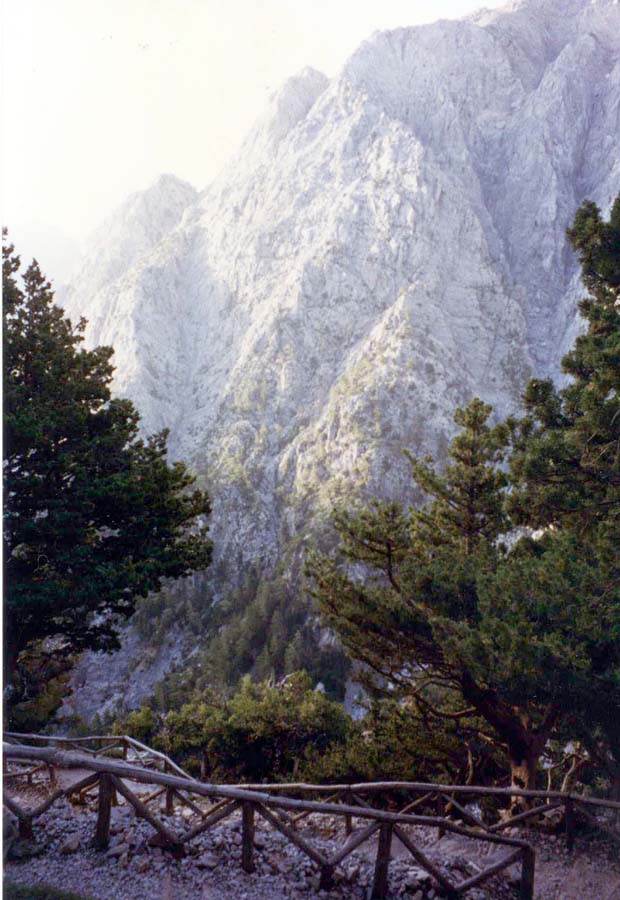 |
Xylůskalo Entrance to the Samaria Gorge |
Although mountains run from east to west across the island, the most rugged and handsome are the Lefka Ori (White Mountains) in the west. They epitomize the essence of Crete which is virile, proud and fiercely independent, like the Cretans themselves who exploited this brutal terrain to launch their resistance against the Turks. Fifty eight peaks over 2000 m. in altitude are found here. The land is dissected by dramatic gorges that form small, fertile valleys and isolated plains high in the mountains and give rise to some of the most spectacular views that are framed against the Libyan Sea to the south and the Sea of Crete to the north.
The Samaria Gorge
On the southern side of the Omalos plateau, the Samaria National Park
was established to protect the endemic flora and fauna of this
fascinating region that encompasses Europe's longest gorge and a number
of smaller gorges. It is one of the two remaining habitats to the Cretan
wild goat or Kri-Kri (Capra aegagrus cretica) that lives in secluded
hollows on the mountainside. The Kri-Kri are usually seen in the
afternoon but their shyness makes it unlikely to glimpse
one. Unfortunately, there are only about 2000 animals remaining on the
entire island and they face an insecure future: hunters still seek them
for their tender meat, grazing grounds have become more scarce and
disease is a harsh reality for these beautiful creatures. Other
endemic animal species include the Cretan badger, the Cretan marten, the
Cretan spiny mouse, and the Cretan weasel. Only the fortunate will see some
the the rarest birds of Europe such as the griffon
vulture (Gyps fulvus) and the lammergeier (Gypaetus barbatus).
Bonelli's eagle (Hieraaetus fasciatus) and the golden eagle (Aquila
chrysaetos) are sometimes sighted here as well.
The 18 km hike through the Samaria Gorge begins at Xyloskalo on the Omalos plateau 1200 m high. To the south is a majestic view of Mt. Gygilos with its lunar landscape that is of great interest to rock climbers. Sheer cliffs and mighty peaks surround the fertile highland plain of Omalos where ancient olive trees still grow. Below, the great gash of the Samaria gorge was carved by mountain torrents making their way steeply to the Libyan Sea. According to Greek mythology, one of the Titans living on Crete slashed the land with his knife to create the gorge while Cretan-born Zeus, the god of the heavens, placed his throne on top of Mt. Gygilos and raced his chariot on the nearby mountain plain of Angathoti.
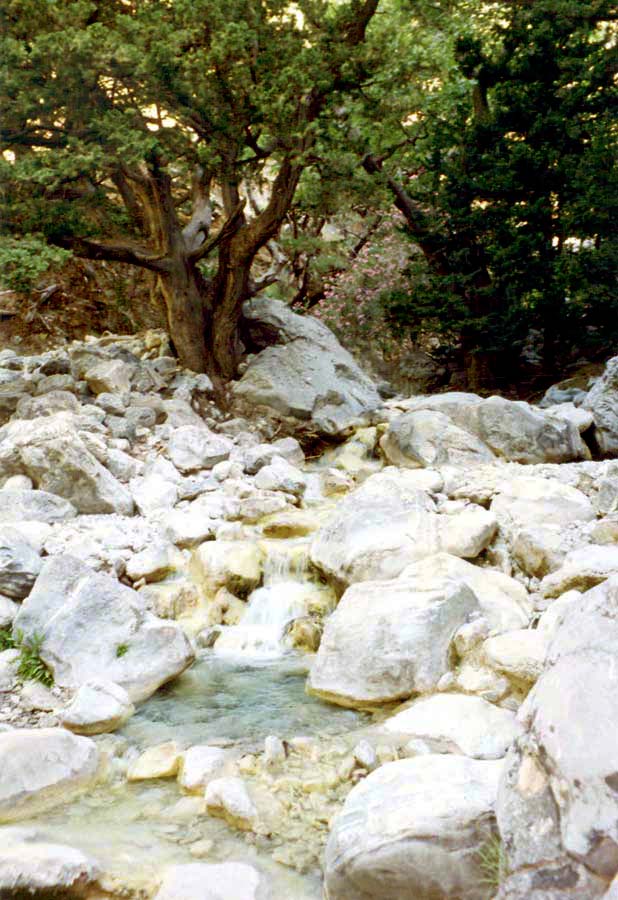 |
The small stream that flows through the gorge can become a raging torrent in springtime |
A well-maintained path drops down to the bottom of the gorge through a fragrant forest of pine and cypress trees. Along the way, there are many species of flora, some of which are endemic to Crete and found only in this gorge. Wild herbs that grow profusely in the nooks and crannies of the cliffs, release their fragrance with only the slightest touch. Some think that the Cretan climate encourages a higher concentration of essential oils in the plants, resulting in the flavorful food and good health for which Cretans are renowned.
Although this area has been relatively isolated, remnants of ancient settlements exist. The Sanctuary and Oracle of Apollo are believed to be located under the church of Aghios Nikolaos and in the vicinity of Afentis Christos. The more recent Samaria settlement which was abandoned when the gorge was proclaimed to be a National Park can also be explored. Nearby is the church that was dedicated to Saint Maria of Egypt after whom the gorge and settlement were named.
Farther along, the narrowest point in the gorge is reached. Known as "Portes" or "The Gates," it is the most photographed part of the gorge because steep cliffs rise dramatically to a height of over 300m with a very narrow passage of only 3.5m. This is one of the areas where, in early spring, hikers may have to wade through the stream because the water level is higher from the melting snow. The southern boundary of the National Park ends just north of Old Agia Roumeli. There are kiosks that sell refreshments and souvenirs including the prized Samaria Gorge thyme honey. From here, it is a short walk to Agia Roumeli where it is possible to enjoy a refreshing swim before catching the ferry to Hora Sfakion.
The Lefka Ori
The White Mountains are comprised of three groups of mountains that are
loosely identified as the eastern, central and western ranges. Of the
many peaks, Pachnes (2453m) is the highest and the 2nd highest in Crete
being only 3m lower than Mt. Psiloritis. George Sfikas relates an
interesting story whereby mountaineers of Western Crete have been
carrying rocks up to the Pachnes peak to increase its elevation to that
of the highest peak in Crete. However, if the story is true, their work
has not yet been recognized.
In profile, the Lefka Ori are decidedly jagged with peaks that are sometimes snow-covered until early June. Here, at the edge of the melting snow, some of the most unusual and exquisite flowers in Crete can be found. The mountains maintain an aura of impregnability that is substantiated by any map of Crete. Roads partially encircle this stark, lonely region but the only passage through is by following the old footpaths created by shepherds and their animals. The isolation extends to the southern coastline where the massive mountains plunge precipitiously into the sea. There are no coastal plains but small pockets where villages have developed and are reached only by foot or by boat.
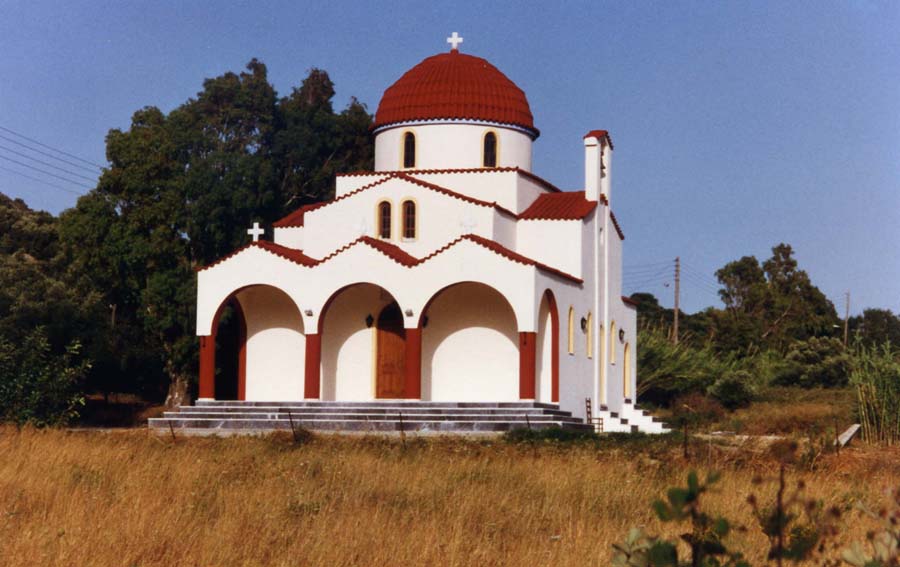 |
Small Church |
The 111 peaks over 1500 m. high make the White Mountains an inveterate paradise for hikers. If time is limited, there are many interesting day hikes to nearby peaks from the village of Omalos. Mt. Gygilos (2080m) in the western range is one of the more popular destinations. The return trip of this moderate climb takes about 5 - 6 hours. However, those who plan to spend several days exploring the western range can make arrangements to stay at the Kallergi refuge that is about an hour and a half from Omalos. A more strenuous hike is found in the "European Trail" from Omalos to Anapolis which passes through the eastern range. This takes 2 or 3 days depending on whether or not Mt. Pachnes is to be climbed. There are refuges that can be used along this trail but be prepared to carry a full pack because there are few springs in these bare, dry mountains and hikers must carry an adequate supply of water.
Best Times to Go: Mid-April to Mid-June is best for exploring the Lefka Ori and its gorges. Wildflowers are profuse and the temperature is cooler. It is also the best time to visit coastal Crete to avoid the crowds and the heat of summer.
Getting There: Hania is the main point of entry to Western Crete and is accessed by air from Athens or by ferry from Piraeus. There are ferry links to other cities in Crete but you will have to make your way to the Hania area which is the most practical base for exploring the White Mountains.
Clothing/Gear: Clothing requirements are seasonal. Hiking the Samaria Gorge requires only good walking shoes and a picnic lunch if you want to take the time to admire the scenery and the flowers. Bring binoculars to search the cliffs for the elusive Kri Kri. There are numerous springs so no water bottle is needed. Trekking in the Lefka Ori requires hiking boots, your water bottle and a comfortable back pack as you must carry all your food and water requirements.
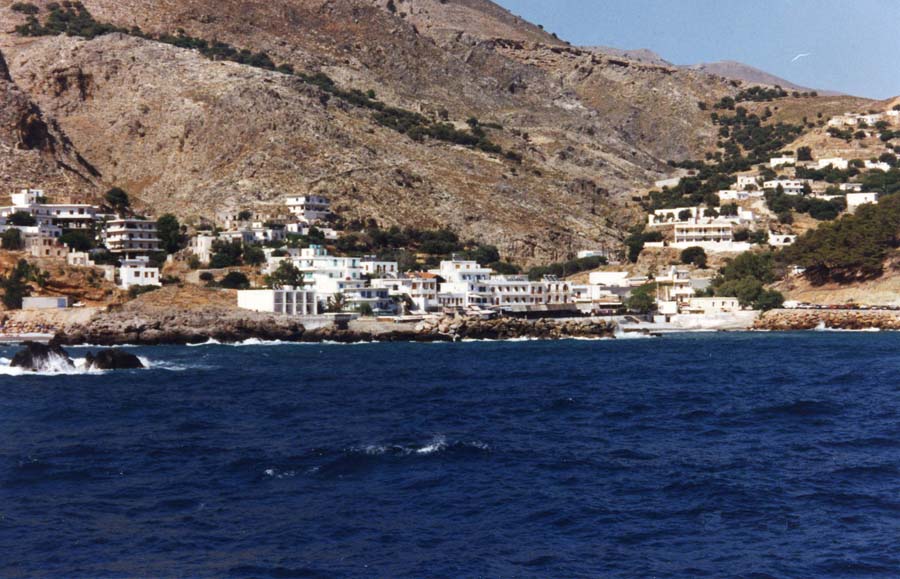 |
Agia Roumeli |
General Information:
Hiking the Samaria
Gorge takes about 5-6 hours.
From Hania, numerous tour buses will drop you off at Xyloskalo and pick
you up at Hora Skafion. Your hotel tour desk can usually arrange this
for you. Private arrangements can also be made. If you have a group of
four or more, this will often be less expensive and much more
convenient. Allocate about $50 per person for transportation from Hania
to Xyloskalo, park entry fees, ferry from Agia Roumeli to Hora Skafion
and the return trip to Hania. The entire trip takes about 12-14 hours.
Be sure to check the ferry schedule before starting your hike.
Trekking in the Lefka Ori should never be attempted on your own. A
guide is strongly recommended and can be arranged through the Hania
chapter of the Greek Alpine Club (EOS), 90 Tzanakaki, Tel. 30-28210-44647.
Use of the mountain refuges must also be arranged with the EOS . From
a practical standpoint, it is much easier to plan your trip through a
local trekking company. Transportation can be a challenge in some of
these isolated areas and buses are infrequent when they are available.
Unless you have local friends with free transportation, savings in
planning your own trek will be minimal. Costs are about $100 per
person per day for an all-inclusive trek.
The Low Season, April 1st to June 30th, is not only the most comfortable
time to explore the Lefka Ori, but it also offers the best values in
accommodations and car rentals. In Hania, there are hotels, apartments
and pensions to suit any budget. If you have your own transportation,
the coastal area to the west of Hania offers some excellent bargains. A
modern one-bedroom apartment sleeping four with incredible views of the
sea and the mountains costs about $75-$100 per night. A basic car with
standard drive and no air conditioning costs about $50-$75 per day.
Lodging and car rental rates increase by about 50% during the High
Season from July 1st to October 15th.
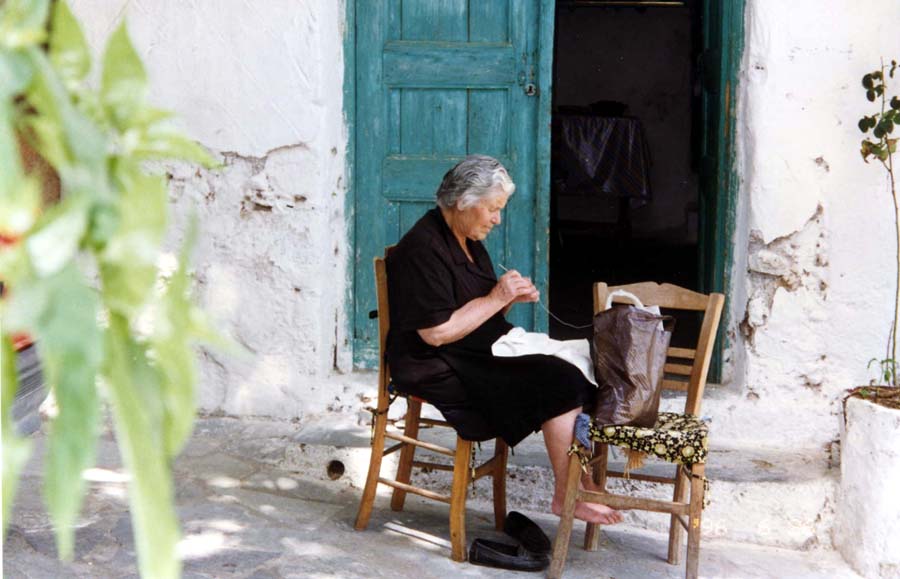 |
Typical Cretan scene of a lady crocheting |
Planning Tips:
Important Resources:
11-19 Boniali Str
731 34 Hania, Crete
Greece
Tel: 30-28210-50939
Fax: 30-28210-53309
Email: info@alpine.gr
Alpin Travel specializes in planning treks in Crete, other areas of Greece and special international expeditions. George Antonakakis, the general manager, is an affable, renegade computer analyst who has chosen to pursue the real love of his life-outdoor adventuring. He is also a certified guide, a member of the mountain rescue team and a member of the Hania Mountain Climbing Club, one of those fellows reputedly carrying rocks up to Pachnes Peak.
Alpin Travel will make all arrangements for your hiking, mountain climbing and mountain bike adventures in Crete. They also offer rock climbing and parasailing into the mountain valleys of Western Crete but these activities are beyond the scope of these pages. If you are specifically interested in viewing the Kri Kri in their natural habitat, George may be able to help you. Be sure to ask about their traditional mountain village accommodations at Milia.
Related Books:
by George Sfikas is an excellent resource on
mountain climbing in Greece. It provides trail descriptions, maps and
interesting aspects of history, mythology and folk poetry as they
relate to the mountains. It is available in English at the Compendium
Bookshop at Nikis 28, near Syntagma Square in Athens.

Adventures Great and Small © copyright 1996-2005